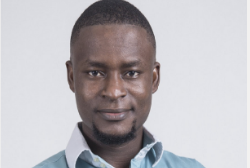25/10/24, 17:00 Athens time, Science Building 145Π58, talks by Dr. Shantanu Singh and Dr. Florent Koudohode
1. "Numerical and Lyapunov-based investigation of the effect of stenosis on blood transport stability using a control-theoretic PDE model of cardiovascular Flow" by Dr. Shantanu Singh
Bio
Shantanu Singh is post-doc in Department of Electrical and Computer Engineering at Technical University of Crete. He completed his PhD from Tel Aviv University, Israel. He was a Marie-Curie fellow from 2018 to 2022. He received his master’s degree in Electrical Engineering at Indian Institute of Technology, New Delhi. His research interests are distributed parameter systems with applications to boundary control systems, flow systems and hyperbolic partial differential equations.
Title
Numerical and Lyapunov-based investigation of the effect of stenosis on blood transport stability using a control-theoretic PDE model of cardiovascular Flow
Abstract
We perform various numerical tests to study the effect of (boundary) stenosis on blood flow stability, employing a detailed and accurate, second order finite-volume scheme for numerically implementing a partial differential equation (PDE) model, using clinically realistic values for the artery's parameters and the blood inflow. The model consists of a baseline 2x2 hetero-directional, nonlinear hyperbolic PDE system, in which, the stenosis' effect is described by a pressure drop at the outlet of an arterial segment considered. We then study the stability properties (observed in our numerical tests) of a reference trajectory, corresponding to a given time-varying inflow (e.g., a periodic trajectory with period equal to the time interval between two consecutive heartbeats) and stenosis severity, deriving the respective linearized system and constructing a Lyapunov functional. Due to the fact that the linearized system is time varying, with time-varying parameters depending on the reference trajectories themselves (that, in turn, depend in an implicit manner on the stenosis degree), which cannot be derived analytically, we verify the Lyapunov-based stability conditions obtained, numerically. Both the numerical tests and the Lyapunov-based stability analysis show that a reference trajectory is asymptotically stable with a decay rate that decreases as the stenosis severity deteriorates.
2. "Simultaneous Compensation of Input Delay and State Quantization for Linear Systems via Switched Predictor Feedback" by Dr. Florent Koudohode
Bio
Florent Koudohode received his Ph.D. degree in Automatic Control from LAAS-CNRS, Université Paul Sabatier, Toulouse, France, in 2023. He completed two M.Sc. degrees in fundamental mathematics and applications, one from IMSP, Dangbo, Benin in 2018, and the other from Université Paul Sabatier, Toulouse III, France in 2020. He is currently a Postdoctoral Researcher in the Department of Electrical and Computer Engineering at the Technical University of Crete, Greece. His research interests include distributed parameter systems, event-triggered control of PDE, quantization, time-delays systems and nonlinear control.
Title
Simultaneous Compensation of Input Delay and State Quantization for Linear Systems via Switched Predictor Feedback
Abstract
We develop a switched predictor-feedback law, which achieves global asymptotic stabilization of linear systems with input delay and with the plant and actuator states available only in (almost) quantized form. The control design relies on a quantized version of the nominal predictor-feedback law for linear systems, in which quantized measurements of the plant and actuator states enter the predictor state formula. A switching strategy is constructed to dynamically adjust the tunable parameter of the quantizer (in a piecewise constant manner), in order to initially increase the range and subsequently decrease the error of the quantizers. The key element in the proof of global asymptotic stability in the supremum norm of the actuator state is derivation of solutions' estimates combining a backstepping transformation with small-gain and input-to-state stability arguments, for addressing the error due to quantization.

